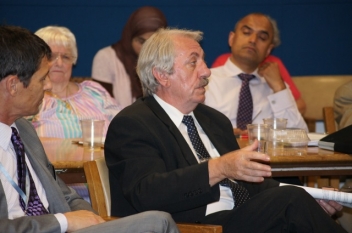 I work with older persons organisation Zivot 90 in the Czech Republic.
I work with older persons organisation Zivot 90 in the Czech Republic.
This week I attended the second Open Ended Working Group (OEWG) at the UN in New York which met to discuss the protection of older people’s rights.
Developing country issues are not so visible in my government, there are just two NGOs doing something for older people in developing countries. The rest are working on the rights of other groups, children, women, humanitarian responses. Only two are really working with older people.
I wanted to hear, at this very global organisation of the UN, about what delegations from different countries are thinking about older people, what they know, whether they are listening to the voices of older people.
Over the last three days I was a little bit surprised at the different positions of countries and regions about older people’s rights and if a new convention is the best way to protect them.
I felt that South American countries, such as Argentina, Brazil, Chile, are strongly for the adoption of such a convention but the European Union countries are opposed to this or not too much for it. As I understand, they want to use other instruments on the table such as the Universal Declaration of Human Rights, the Madrid International Plan of Action on Ageing and other instruments.
My feeling is that the position of the EU is probably not 100% but more like 90% a common position. They are working as the EU, co-ordinating policies, probably as one block opposed to a new convention and want to follow existing instruments. They are not against older people’s rights, of course, they want to do more, but in the framework of existing human rights instruments.
Not too old to get nervous
I am old enough but even I got a little bit nervous in front of so many delegations from all over the world and this back row full of representatives of NGOs!
It is not so easy but thanks to my experience from other forums I was able to use the opportunity to talk about the EU position on social exclusion and to talk concretely, not like some other presenters who have talked about wide issues, like life in India or the position of older women.
I consulted with the organisers before the meeting and talked with them about how to target the issue completely as I only had 12-15 minutes. I hope everyone was satisfied. I got some congratulations from different people and from the EU representative to the UN.
I appreciate being able to talk about the EU position in a UN forum. Older people’s rights are a really important issue and I hope the mandate of this working group will be prolonged.
Even if a convention is not adopted, there is still a discussion happening about older people in developing countries. Older people have some problems in Europe but not so much – they are more integrated into society so even if they have problems they are more mainstreamed, not so isolated. They are not killed for being accused of witchcraft.
When I go back home, I’ll tell the people I work with, that the work we are doing is on the right track.
What next?
Oldrich Stanek is an older activist who actively supports our Age Demands Action campaign which aims to improve conditions and protect the rights of older people all over the world.
You can help support older people’s rights by supporting the campaign and signing the Age Demands Action petition.
